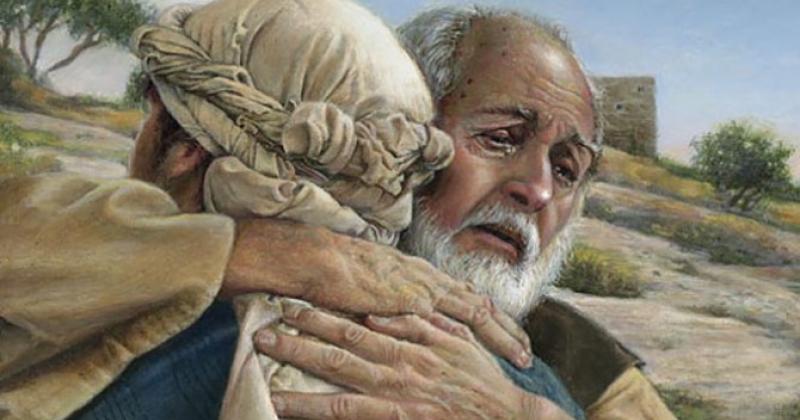We were told recently at a retreat that if only one piece of Scripture survived in a post-apocalyptic world, the parable of the Prodigal Son would suffice for the propagation of the Gospel. The three main characters, father, son and elder brother portray God’s love and forgiveness in a unique and compelling way. The two great commandments of loving God and loving our neighbor are presented in a fashion that is multi-layered and rich in content and context. Rather than entering into a lengthy exegesis, I would like to focus on these three persons in a way that will attempt to see the story from each person’s perspective. The three pillars of Lent — prayer, fasting, and almsgiving — will be explored with a focus on fasting.
The Father
To be wealthy in ancient Palestine, one would have to own land and livestock. Having sons would be integral to managing the holdings in addition to ensuring an equitable transfer of assets at the appropriate time. The time, traditionally, would be as death was imminent. For a son to ask a father for a share of his inheritance ahead of time would defy tradition and propriety. The father would have been completely within his rights to refuse the request and put the subject to rest. Instead, the son’s request is granted. At this point in the narrative, the father’s reasons for acquiescing are unknown. Whether out of weakness or sympathy, the die was cast and the story continues. Fasting from the exercise of power and the immediate solution to a serious problem could have easily been at play here.
The Prodigal Son
Who among us has not let money “burn a hole in our pockets”? Even if some of us remain frugal and moderate in our lives, we certainly know of the prodigal behavior of others. Someone once offered this prayer at a gathering: “Lord, please help me despise my sins at least as much as I despise those of others!” Jesus said this in so many words when He asked: “Why do you see the speck in your neighbor’s eye, but do not notice the log in your own eye?” (Matthew 7:3-5 NRSVCE) When we hear of someone squandering money, time or talent in a flagrant way, we can find false consolation by measuring our sins against theirs. Even though the wayward son had dissipated his inheritance and was forced to fast as a result, the benefit of doing without eventually led him to repentance.
The Elder Brother
Of all the sins committed among these three, the sin of the elder brother ultimately carries the most weight. The father forgave, and the prodigal son asked for and received his forgiveness. The elder brother remained in his bitterness and lack of forgiveness, and as a result absented himself from the feast that was given celebrating his brother’s return. In spite of his being invited and welcomed to take his place at the table, he chose self-exclusion. If we view the feast as a comparison to the Eschatological Banquet, and the elder brother’s self-exclusion, we can see that fasting from bitterness would have been just what was needed for reconciliation in the family.
Heaven And Hell
The Catechism of the Catholic Church defines the state of Hell as “definitive self-exclusion from communion with God and the blessed” (CCC § 1033). The elder brother, at least as far as the parable takes us, chose to exclude himself from the rest of the community. I would like to think that, eventually, the elder brother came to his senses and joined the festivities. To do so, he would have had to fast from his bitterness to make room for forgiveness and mercy.
Our Lenten Journey
As we enter into Lent this year, let us renew our commitment to prayer, fasting, and almsgiving. Prayer, both private and communal, can be nurtured and nourished by fasting. Fasting can be more efficacious when done as cheerfully as possible while avoiding bitterness. Jesus encourages us, through scripture, to approach fasting in this way (Matthew 6:16-18). In almsgiving, Jesus advises us in the Gospel of Luke “When you give a dinner or a banquet, do not invite your friends or your brothers or your kinsmen or rich neighbors” (Luke 14:12). These people most likely can and will repay you. The encouragement to give to people who cannot repay us will give wings to our almsgiving and selflessness.
Forty Days of Grace
Let us pray for all of the blessings that God has placed in our forty days of Lent. Some are directly on our path while others are hidden from direct view; still others are “blessings in disguise”. We can use the examples of the repentance of the Prodigal Son, the boundless mercy of his father and the challenge to fast from bitterness offered to the older brother, to guide us on our journey toward Easter.
